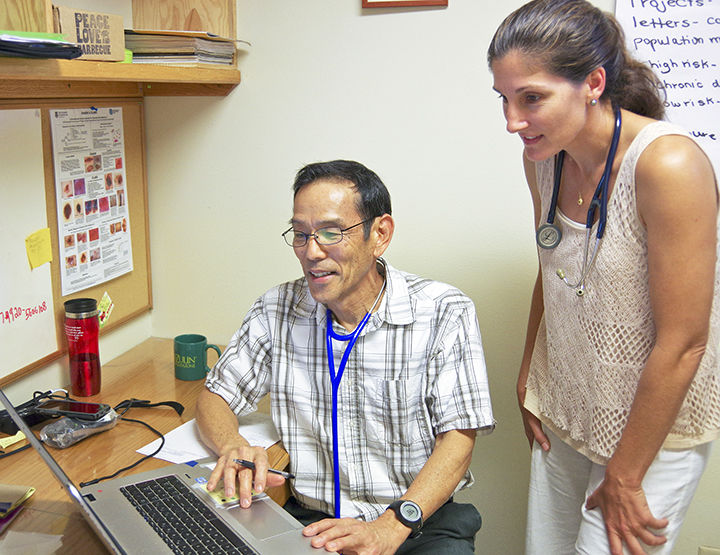LIHUE — If you think it takes a long time now to see a doctor, just wait. Hawaii residents may find it more difficult to see their doctor or medical specialist over the next few years. A study released by
LIHUE — If you think it takes a long time now to see a doctor, just wait.
Hawaii residents may find it more difficult to see their doctor or medical specialist over the next few years.
A study released by the John A. Burns School of Medicine at the University of Hawaii found that 300 more physicians in primary care are needed statewide. All told, the state needs 3,690 doctors but has 2,800, the study found.
Some are calling it a crisis situation.
“If we all get the flu at once, we’re going to overburden our physician offices, so we’re not going to be able to get treatment in time,” said UH medical professor Dr. Kelley Withy, who helped author the report that is slated to be presented to state lawmakers. “We’re going to have to go to the emergency room, probably wait a long time and get treated there. Then we’re overburdening the emergency rooms, of course, and costing more money, but the bottom line is, maybe we won’t get treated, maybe we’ll be sicker. Some of the people who don’t get treated could die.”
The Health Resources and Services Administration designated Kauai and Niihau as having a “medically underserved population” in 2000.
Kauai Hospice Medical Director Dr. Robert Weiner, who retired as a general surgeon about a year and a half ago, said physician shortages on Kauai have been an issue since he and his wife moved here and began practicing 38 years ago.
At that time, Weiner recalled that his wife, Dr. Linda Weiner, was the only pediatrician on the island.
“Whenever people are trying to get an appointment and have to wait a long time, there’s a shortage,” Weiner said. “Just a few years ago, I can remember trying to establish care with a primary care doctor here on the island, and I had to wait six months for my first appointment.”
Dr. Paul Esaki, who runs a family practice in Kapaa, said those same findings have been evident for several years.
“On Kauai, my gut feeling is that there is kind of is a shortage in internal or primary care, but Wilcox just hired several pediatricians, family practice and internal medicine,” he said. “On the Westside, there has been a turnover in some specialists as well as primary care.”
Interim Hawaii Health Systems Corporation Kauai Region CEO Scott McFarland, however, said he wasn’t so sure.
“Economic models and studies indicate that there is not currently a physician shortage on Kauai based on its population of 69,512, with the exception that the island could likely benefit from another provider who specializes in dermatology,” McFarland wrote in an email. “This could change as current physicians retire in the decade ahead or move off island for more lucrative compensation opportunities in larger market service areas with higher populations.”
To address local physician wait times for primary care, McFarland said staff at the West Kauai Medical Clinic at Kalaheo has responded by allowing new and existing patients to call for same day appointments.
Though he has recruited nearly a dozen doctors to Kauai over the last three decades, Weiner said there are major challenges in attracting doctors to Hawaii. Among them are lower medical reimbursement rates from insurance companies compared to other states and the high cost of living.
Another factor that can sometimes dissuade doctors from moving here is the happiness and well-being of their spouse and family.
“A lot of people are married to spouses who work in specialized fields and sometimes they can’t quite find it on, say, the Big Island, where their spouse is, so the doctor ends up leaving because they’re not happy with their job opportunity,” Weiner said.
Even recruiting doctors born and raised on Kauai isn’t easy.
“I can tell you that I know a lot more doctors who were born here and grew up here but now practice somewhere else — they never came home to practice,” Weiner said.
But some progress has been made over the years in bringing doctors to Hawaii, he said.
“When I came here, there were only three surgeons on the island, but now there’s about seven, and I’m not even one of them anymore,” he said.
And Wilcox Memorial Hospital spokeswoman Faith Campbell said it filled all their vacancies.
Although Esaki is nearing the age when most people retire, the Kapaa High School alumnus said he has no plans to do so.
“I’m almost a senior citizen, so there’s always this concern among my older patients, who tell me, ‘Don’t retire until I die,’ or that kind of thing,” Esaki said with a laugh.


